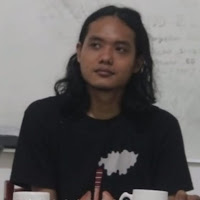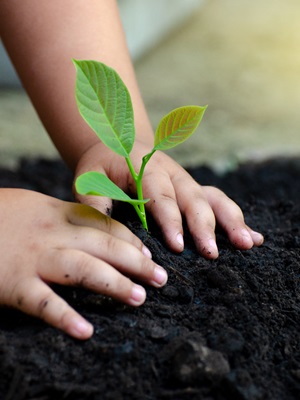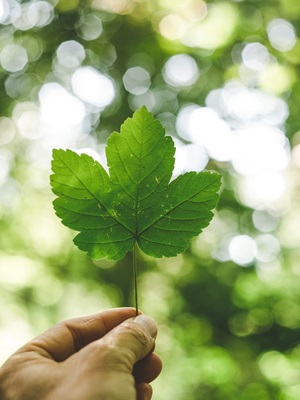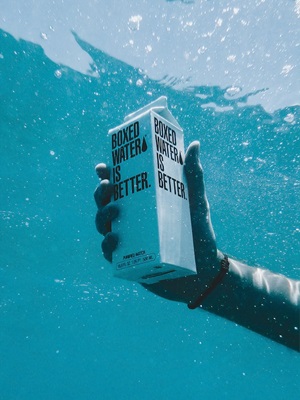Shortly after the morning prayer call at 5 am, Amrizal (32) hustled from his home. He carried a small jerry can of fuel and rushed to Kampung Laut pier in the Kuala Jambi District, Tanjung Jabung Timur Regency, Jambi Province, northwest of Jakarta
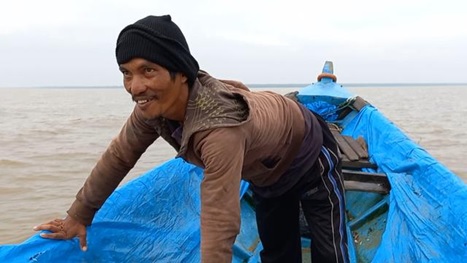
Amrizal, a fisherman from the Duano tribe, sailing the eastern coast of Indonesia’s Jambi Province on Thursday (12/9/2022). Most fishermen in Jambi Province’s eastern coastline have decreasing catch from the sea.
People were busy preparing supplies to fish in the sea on that pier. Amrizal is a fisherman from the Duano tribe. For the indigenous Duano, the sea is an extension of their cultural identity. Wooden fishing boats with outboard motors or pompong in the local language and canoes were lined up and tied to the pier’s poles, made from nibung woods, which is an Asian specie of palm tree in the Arecaceae family. Amrizal immediately poured the fuel from his jerry can into his pompong’s tank. This is his daily routine before fishing.
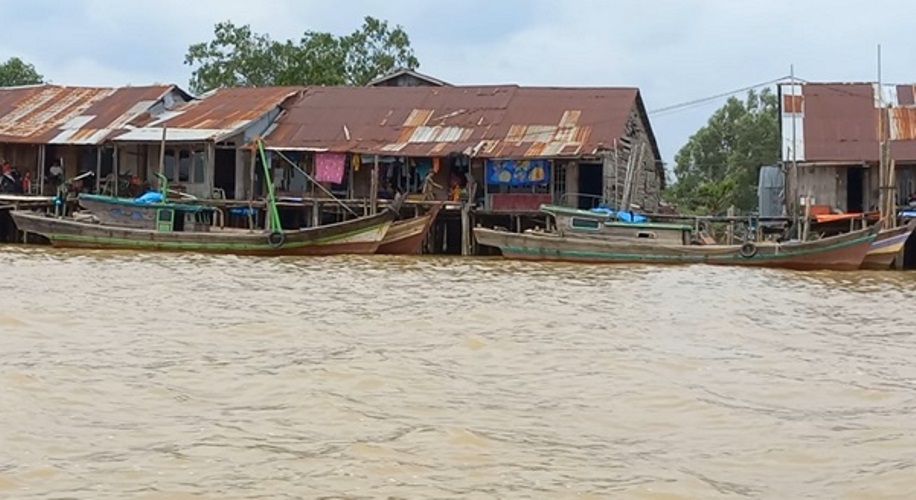
Duano Tribe settlements on the east coast of Jambi, precisely in Kampung Laut, East Tanjung Jabung, Jambi
He invited me to board his 4-by-1.5-metre boat. Racing with time, Amrizal turned on the engine. The small wooden boat powered by outboard motors slowly crept over the coastal current, leaving the pier of Kampung Laut towards the sea. The constant rumbling sound from the engine silenced us during the one-hour ride.
Slowly, the Friday dawn was rising, illuminating the entire horizon. Amrizal’s boat then reached its destination. He turned the engine off and lowered the anchor. He instantly cast a 600-metre fishing net and hoped to catch many fishes with his nets.
“I’m afraid of catching fish in the area far from the coast. It’s dangerous in the open sea,” Amrizal said. He did not want to take the risk because he did not have enough supplies, just bottled tea and bread. He had no first aid kits, not even a life jacket.
Most members of the Duano tribe depend on their catches from the sea. Amrizal reminisced that in the past, he could gain so much catch from a day of fishing. In the past half-decade, he needed to work harder with uncertain results. He also had to pay his boat’s instalments to the wholesaler who buys his fish.
“Today, the most I get per day is about IDR 100,000 (US$6.70), and I still need to pay for fuels and boat instalments to the wholesaler. So, I can only get IDR 50,000 to bring home.” Amrizal sighed.
Amrizal has to look after his wife and three children. He must also pay his eldest child’s tuition fees at a local junior high school. Sometimes, situations were challenging, and he could not make enough money from fishing, forcing him to borrow from his wholesaler.
“Now, fishing cost keeps increasing while our catches keep decreasing. Not to mention the increasing danger of fishing in the sea. These have made our lives, the Duano fishermen who only rely on small traditional wooden boats, very difficult,” Amrizal said.
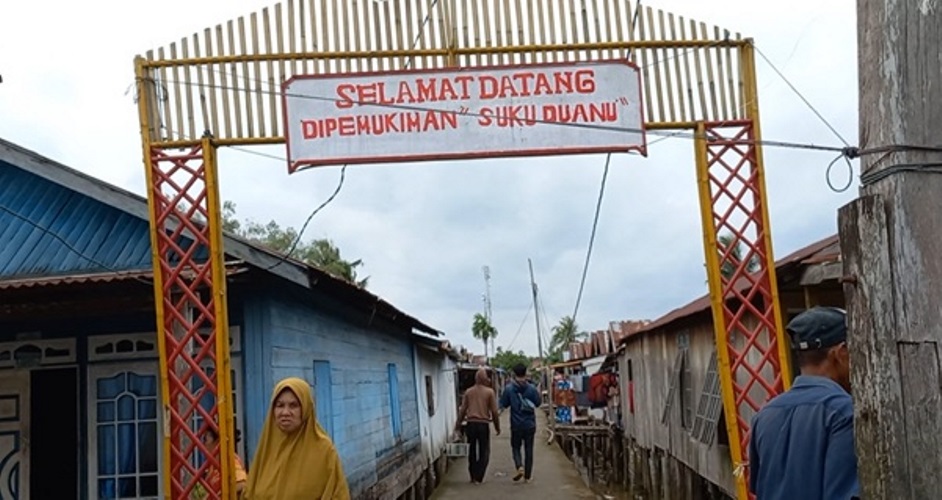
Traditional fishing settlements on the east coast of Jambi.
The situation of the Duano tribe, which has about 77 families left, is very concerning, as their livelihood becomes increasingly exposed to the climate crisis. Their daily activities, which rely on sea catches, face increasing risks due to unpredictable weather patterns.
Amrizal did not understand this unpredictable weather. He kept questioning what could have happened in the past years that led to this. Duano’s local wisdom has become futile in navigating the current maritime weather.
“The sea weather has become irregular. We used to be able to predict the signs of strong wind and big waves easily,” Amrizal explained.
In the past, the eastern coast of Jambi was promising for the fishermen and had plentiful catches, from fish, crabs, clams, to prawns. “Currently, it has become more difficult with the changing fishing cycle,” Ninggal said.
Climate Crisis, Social Inequality and Human Rights Issues
More and more Duano fishermen are going further and further out to sea. Meanwhile, the resources to go to the high seas are inadequate. Currently, they face higher operational costs due to the rising price of fuel oil.
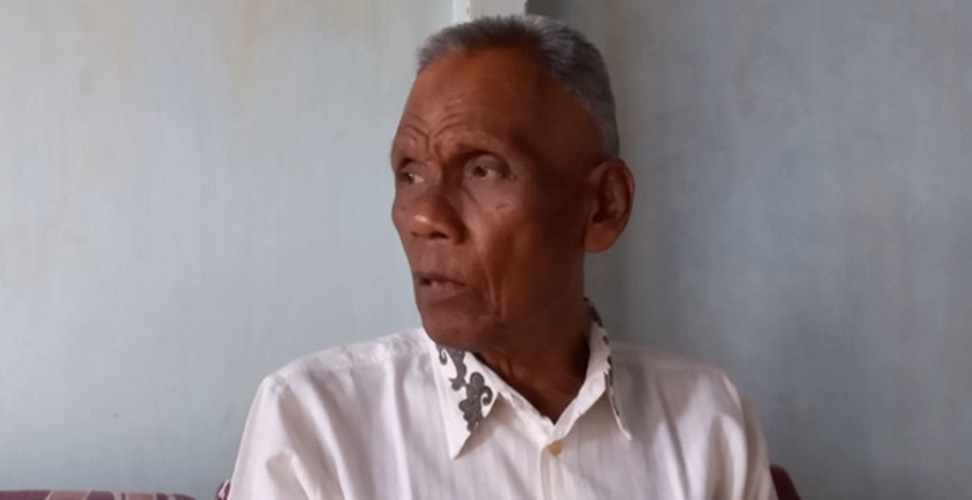
Asri Tara, a traditional leader of the Duano Tribe in Kampung Laut, East Tanjung Jabung, Jambi.
Asri Tara, an elder of the Duano tribe, said that most of the tribe do not have boats to go to sea. Of the 77 families of the Duano tribe who live in Tanjung Solok, only nine per cent own ships or boats. The rest became workers for financiers who own ships with a profit-sharing system.
Climate change also has cultural implications. For instance, the way of life of looking for Sumbun shells is slowly being abandoned by Duano fishermen. In the past, this activity was closely related to the tribe, but now due to rising sea levels, the shoals, which are the habitat of Sumbun clams, are sinking.
Women’s fishermen groups are also slowly disappearing. They do many activities on land now. Mak Ijah, for instance, has stopped going to sea. She is now busy selling snacks at home. "Sometimes I work as a fish splitter," Mak Ijah said.
Notably, the climate crisis has brought this group of fishermen to the brink of poverty. Meanwhile, the local government has not developed mitigation plans for the climate crisis.
In general, the socioeconomic level of the Duano tribe in Tanjung Solok is low. "The highest [educational level] is junior high school, and some may become high school graduates but none continues to college," said Asri. "Because of limited funds, how do you educate your children," continued Asri Tara.
Social inequality, said Asri Tara, is made worse because those who occupy the Tanjung Solok area until now do not have land rights. The houses they live in are built on other people's land. The government has no provided no solutions regarding the status of their current residence.
"We don't have a boat, and our land is still occupied. We hope that there will be boat assistance for us to go to sea independently and a solution to our housing so that our lives are better," said Amrizal.
During the District Development Plan Meeting (Musrenbang) in the Pola Room of the Regent's Office in 2017, East Tanjung Jabung Regent Romi Haryanto admitted that Kuala Jambi was one of the pockets that contributed to the lowest standard of living in the eastern coastal district of Jambi.
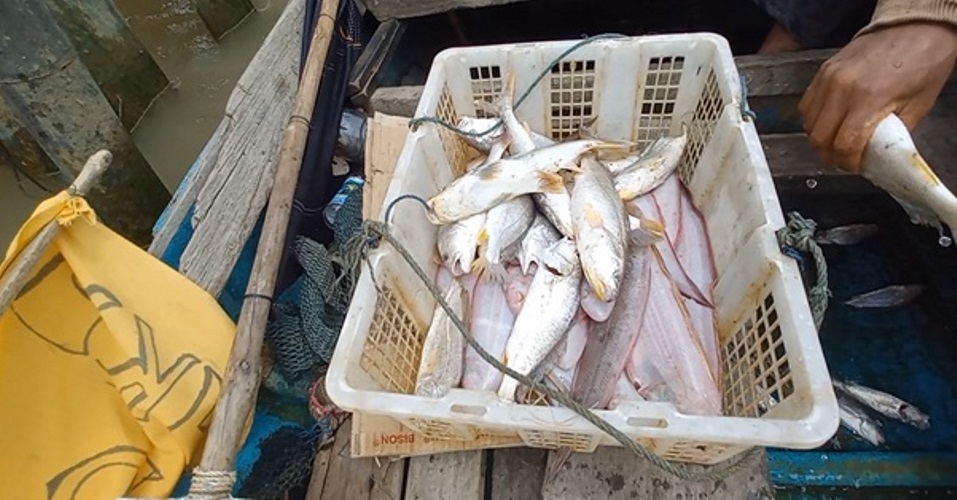
Amrizal, a fisherman from the Duano tribe, moves sea products to be sold to the Tauke (boss in local language) in Kampung Laut, East Tanjung Jabung, Jambi, Thursday (9/12/2022). Duano fishermen are now facing the threat of climate crisis and economic inequality.
The life of the Duano tribe fishermen does not seem to have moved out of the poverty line, which is reflected in the statistical graph of the local office.
The head of the East Tanjung Jabung Regency Fisheries Service, Hendri, did not deny that Kuala Jambi, where there is a Duano tribe village, is one of the poverty areas . He added that the empowerment and the institutionalisation of fishermen are challenging.
Jambi University Human Rights and Development Studies Centre Coordinator Doni Yusra said that the state is constitutionally responsible for the economic well-being of its citizens, including ethnic minorities whose average income is below the poverty line.
These economic, social and cultural (ESC) aspects are enshrined in international and regional human rights instruments as fundamental rights that must be protected. The state is obliged to protect them.
Human rights, said Doni, is attached to human welfare issues that must concern all parties. In addition, human rights, according to him, are not merely about legal norms and instruments. "Human rights are also part of welfare, which fundamentally is the right to live," said Doni.
"I think only political will can fulfil the rights of our indigenous peoples. The government must guarantee how their lives should be," said Doni.
Doni continued that the community cannot be treated the same way as the general public. According to Doni, indigenous peoples are unique, so the policy approach must be special.
"Many indigenous people are marginalised. With climate crisis and exploitation of natural resources, their lives are further marginalised," said Doni.
Maritime Nation Irony
Maritime country is the nickname of our nation. That's why since childhood, Indonesians have been familiar with the song: “My ancestors were sailors.” Every September 23, Indonesia celebrates National Maritime Day.
Susan Herawati was dismayed when she saw the conditions of fishing villages in various regions. The Secretary General of the People's Coalition for Fisheries Justice (Kiara) - a non-profit organisation focusing on marine and fisheries issues - found multiple burdens fishermen face due to the climate crisis.
"The impact of the climate crisis is extraordinary, and fishermen are among the most vulnerable," said Susan.
Based on data from the Ministry of Maritime Affairs and Fisheries (KKP), Indonesia has a coastline of 95,181 km - the second longest coastline in the world. The sea area reaches 5.8 million square kilometres or 71 per cent of the entire territory of Indonesia.
But fishing villages have become areas of poverty. The number of fishermen in fishing households is also shrinking,
In 2010, the number of fishermen was recorded at 2.16 million people, based on the Indonesian Forum for the Environment (Walhi)’s Marine and Coastal Resources statistics. By 2019, this number reached 1.83 million people, a fall of 330,000. Fishery households in East Tanjung Jabung Regency show a similar trend. Statistical data shows that fishery households doubled before declining drastically in the last two years.
The climate crisis that changes the knowledge patterns of fishermen and makes sea catches increasingly reduced has caused severe poverty, said Susan. Moreover, the state has responded with inappropriate policies.
"Government support is still very minimal regarding this climate crisis. And, the state does not have the right scheme or pattern of empowerment," said Susan.
On the other hand, Susan said, the empowerment programme that occurs is not what fishermen need. Fishermen empowerment has become a state mandate enshrined in Law No. 7 of 2016 concerning Fishermen Protection and Empowerment.
"The protection of fishermen is not only insurance, but when fishermen cannot go to sea, the government must provide other alternative economic facilities. Fishermen have never obtained this," said Susan.
"And the worst thing is that the state has no policy in mitigating the climate crisis that fishermen face," continued Susan.
Life in the fishery is indeed full of risks. Every year there is news about fishermen who are swallowed by the sea, or their ships are destroyed and shipwrecked by storms.
Amrizal is well aware of this. But amid uncertainty and climate crisis, he will continue to go to sea. This is because he is the backbone of his children and wife. "If we don't go to sea, what will we eat," said Amrizal.
Posted 14/04/2023



